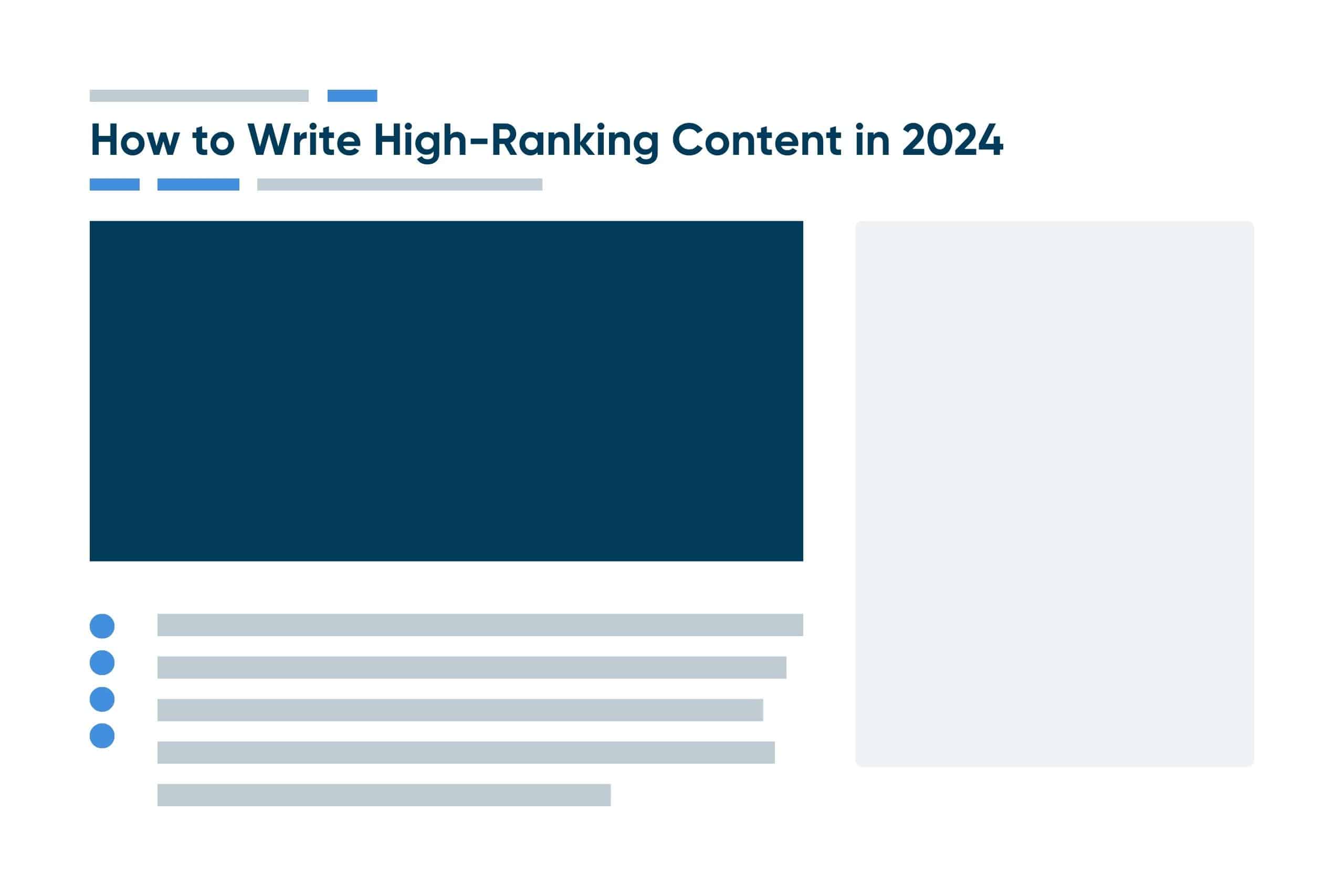
One of the most common questions we receive from clients and potential clients is, "How can I write better content for Google?" Now, although that might seem like a great question to ask, there is a fundamental flaw in the question itself—something we will cover later on.
Many people are unaware of the everchanging improvements—well, let's call them changes instead—to the Google algorithm, making it hard to conceptualize the best approach for content writing in 2024. In this post, we will not only find some better questions to ask about SEO, but we will demystify the infamous Google Algorithm with internal and external research as well as real-world data. So, let's dive in.
What is the Google Algorithm?
The Google Algorithm refers to the complex systems Google uses to retrieve data from its search index and deliver the most relevant results for a query. The search engine uses algorithms and numerous ranking signals to deliver webpages ranked by relevance on its search engine results pages (SERPs).
Essentially, Google's algorithms are a series of instructions used to generate results for user queries. When a user types a query into the search bar, Google sorts through billions of web pages in its index to provide the best and most relevant results in a fraction of a second.
Noteworthy Google Updates (Historical)
The Google Algorithm is continuously updated and refined, which means the factors that influence ranking can change. Some of the most essential historical Google algorithm updates include:
- Google Hummingbird: Introduced in 2013, Hummingbird focuses on understanding the context and intent of a user's search rather than just individual keywords.
- Google Mobile-Friendly Update (Mobilegeddon): This update made mobile-friendliness a ranking factor—making it easier for users on mobile devices to find high-quality and relevant results.
- Google Pigeon: Rolled out in 2014, this algorithm update boosted the ranking of local listings in search results.
- Google Penguin: This algorithm, first unveiled in 2012, detects sites spamming search results, particularly those doing so by buying links or obtaining them through link networks primarily designed to boost Google rankings.
- Google Panda: Launched in 2011, Panda is an algorithm that lowers the rank of low-quality or thin sites and returns higher-quality sites near the top of the search results.
- Google BERT (Bidirectional Encoder Representations from Transformers): Introduced in 2019, BERT uses machine learning and natural language processing to understand better what users are searching for.
- Google Page Experience: Rolled out in 2021, this algorithm update considers several metrics related to how users perceive the experience of interacting with a web page beyond its pure information value.
These are among more than 200 factors that Google’s algorithm considers when ranking pages. Alongside these more significant updates, Google continuously makes minor adjustments to its search algorithm to improve the relevance and usefulness of search results.
How Has SEO Changed in Recent Years?
If we take a trip back in time to the early 2010s, SEO looks a whole lot different than it does today. Traditionally, SEO was a technical beast to conquer. Using the correct meta tags, the right keyword combinations, the number of occurrences of your focus keyword, and the placement of your focus keyword were all of the utmost importance.
Fast forward to 2024, and while those aspects of SEO are still relevant, they do not directly influence your rankings as they used to. An excellent way to conceptualize modern SEO is to think of it in two pieces: technical SEO and on-page SEO. To explain this concept further, let's think of SEO as a house. Every house has the same essential components: a foundation, walls, and a roof.
Technical SEO
Like technical SEO, if your home overlooks the basics—in the case of SEO, the basics include a fast website, no broken links, optimized images, etc.—no matter how much decorating or finishing work you do, it will crumble.
In SEO, many people do not optimize their technical performance, making it increasingly challenging to outrank their competitors down the line. More often than not, people either don't know what to look for or don't know how to optimize their websites technically, but technical SEO is the key to on-page SEO success, which we will cover next.
On-Page SEO
On-page SEO can be visualized like the furniture, appliances, and finishes of a home. Just because you have four walls, a foundation, and a roof doesn't mean people will be comfortable in your home. So, with on-page SEO, we can add the human touch to websites, the part that will make people want to interact with a website.
In recent years, Google has placed significant importance on on-page SEO. To explain this concept further, consider on-page SEO as the content—blogs, pages, photos, etc.—and technical SEO as the means to appropriately serve the content in a way that allows your users and Google to interpret your content easily.
"Old" SEO vs "New" SEO Best-Practices
To summarize, traditionally, SEO was all about creating content technically optimized for search engines, like Google, to crawl easily and index, leading to a higher likelihood of better rankings. In 2024, however, while it's still essential to keep your website technically optimized, Google, on several occasions, has stated that its algorithm is designed to favor content that is written for humans, not search engines.
Can you see now why that question at the start of this post is fundamentally flawed? But what does it mean to write for humans? Let's get into that next.
Writing for Google vs. Writing for Humans
Which of these sentences sounds more organic?
- Writing content for humans is the best way to outrank your competitors in search engines.
- Writing content for humans is how to write high-ranking content in 2024 and outrank your competitors.
Let's assume we have carbon copies of a website, and the above lines dictate the tone for posts about the same subject with the same title and focus keyword—which, in this case, ishow to write high-ranking content in 2024. Historically, even though line two sounds WAY less organic, it would, without a doubt, have outranked its competitor on a search engine results page (SERP) with a search phrase of 'how to write high-ranking content in 2024.'
This is what we call writing for search engines: finding ways to stuff your focus keyword in your content without it necessarily belonging, making for an awkward tone and a not-very-useful post. You mustn't do this if you want to outrank your competitors.
Once upon a time, the rule of thumb was to have one use of your focus keyword for every 100 words on your page. We have tirelessly studied this rule of thumb and have concluded that even one year ago, it may have been beneficial but is steadily becoming less critical. In some cases, achieving this mark has proven more of a hindrance than anything.
Understanding What it Means to Write for Humans
Now that we've covered the importance of writing for humans and not search engines let's explore what that means exactly. Google was kind enough to provide us with a four-letter acronym that summarizes what "good" content means to them: E-E-A-T.
Unfortunately, there is neither food involved nor a whole lot of detail provided with this explanation. So, we had to take it upon ourselves to figure out what it means to E-E-A-T.
Luckily, we know it stands for Expertise, Experience, Authoritativeness, and Trust. In other words, Google will reward content that is written by someone with personal expertise AND first-hand experience on the subject, posted on a website that has the authority to talk about such a topic, and on a domain that has established a trustworthy rating.
Simplified even further, only write about what you know and do so consistently to build a positive reputation.
It's somewhat unfair to assume that everyone writing blogs will have first-hand experience on the subject, but I can understand the point. Google wants to promote the spread of factual information and stop that of misinformation. Fair.
So, How Can I Write High-Ranking Content Knowing All That?
It's quite simple, really: stay in your lane, bro! If you're a carpenter with 30 years of first-hand experience, don't expect your piece on "Solving the Climate Crisis" to outperform websites like The Ocean Cleanup. Instead, use your knowledge to your advantage. Establish a website with a niche theme, like carpentry in this case, and consistently publish pieces about varying facets of the subject in which you possess the knowledge.
In our case, it would be a waste of time to try and write about the "10 best ways to keep your cholesterol down" because, well, we are a marketing agency and have built our authority with marketing-related topics. But, one caveat: just because you know a lot about something doesn't mean you should throw caution to the wind with your other SEO best practices.
Ensure your website is built on clean code that allows your pages to load quickly. Try to fix and prevent broken links. Make sure your images are appropriately sized. Don't keyword stuff. Write your posts to inform or help other people, not outrank competitors. And most importantly, be consistent.
The secret to SEO is that there is no secret; it's all about patience, consistency, and hard work. Some companies may promise results in 30 days. Well, let us save you the trouble: SEO doesn't work that way. It takes months and years of constant effort to see genuine and sustainable results. If you want immediate results, try Google ads.
The Bottom Line
Now that I've taken up a good chunk of your time, I want to leave you with the key points of today's post. First and most important, SEO is constantly changing. That masterclass in SEO you took last year already contains outdated information. Second, stop writing content intended solely to rank for specific keywords. Make it informative and valuable by asking yourself, "would anyone actually want to read this?" And finally, don't look for shortcuts. We've had many clients come to use in a panic because their previous agencies used black hat tactics, resulting in multi-year penalties from Google, like being shadowbanned and not showing up in any SERPs.
Do the work, or find a reputable agency that knows the rules and follows them. Otherwise, you could be putting yourself at a severe disadvantage in the long term. For more helpful marketing and SEO tips, check out our blog.


